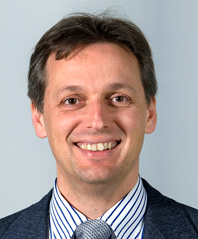
Abstract
In solar cells, free charge carriers can recombine both via bimolecular (Langevin) and trap-assisted recombination (Shockley-Read-Hall). Trap-assisted recombination of electrons and holes is governed by capture coefficients that are thermally activated with an identical activation energy as measured for the hole mobility μp. To elucidate which recombination mechanism is dominant in organic solar cells, we investigated Charge-transfer (CT) state electroluminescence in several polymer:fullerene bulk heterojunction solar cells. The ideality factor of the electroluminescence reveals that the CT emission in polymer:fullerene solar cells originates from free-carrier bimolecular recombination at the donor-acceptor interface, rather than a charge trap-mediated process. These results are in agreement with measurements of the illumination-intensity dependence of the open-circuit voltage.
Biography
Professor Paul Blom received his Ir Degree (Physics) in 1988 and his PhD Degree in 1992, respectively, from the Technical University Eindhoven, Eindhoven, The Netherlands. His thesis work was on picosecond charge carrier dynamics in GaAs quantum wells. He joined Phillip Research Laboratories in 1992. At Philips Research Laboratories he was engaged in the electrical characterization of various oxidic thin-film devices, the electro-optical properties of polymer light-emitting diodes and the field of rewritable optical storage based on phase-change and magneto-optical recording using blue laser diodes. In May 2000 he was appointed as a Professor at the University of Groningen, where his research focused on the device physics of polymeric light-emitting diodes, transistors, solar cells and memories. He co-authored over 300 papers in these research areas. In September 2008 he was appointed as the Scientific Director of the Holst Centre in Eindhoven where the focus is on the realization of electronic systems in foil. In September 2012 he was appointed as a Research Director at the Max Planck Institute for Polymer Research in Mainz, Germany. He ranks among the world’s top 100 materials scientists by Thomson Reuters.